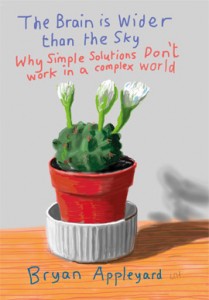Author and Sunday Times journalist Bryan Appleyard – whose acclaimed new book The Brain is Wider Than the Sky was reviewed by Brit here – talks exclusively to The Dabbler about technology, David Hockney, blogging and the increasing polarisation of culture…
Why did you decide to write The Brain is Wider Than the Sky?
One long term reason and one short term. Ever since interviewing Bill Gates in 1994, I have been mesmerised and disturbed by the claims of the technocrats for their new technology. It was to be world-changing and people-changing. These claims have grown progressively more extreme and, in fact, totalitarian. The short term reason is my irritation with call trees – those answering systems that make you miserable when you call companies. It struck me that these were good examples of machines that make our life worse rather than better. Also they simplify people to make them ‘machine readable’.
Do you think The Brain is Wider than the Sky says things that you weren’t able to say in your previous books, such as Understanding the Present or How to Live Forever or Die Trying?
They all say similar things about the modern condition and specifically the impact of science in different ways. This book is closest to Understanding the Present in that it is more general than the others. But it is also much more specific than Understanding the Present because it is more about technology than science.
Do you enjoy the process of writing the books? How does it compare to journalism or blogging?
Enjoyment comes and goes. This one was agony for a number of reasons but primarily because I avoided a linear form because I wanted to suggest I was walking around the subject rather than shoving it in your face – which is just me really. This meant I wrote it once and started again. Also there are aspects of getting it out I don’t like. Journalism is instant gratification, it’s like breathing to me now. I still get adrenalin rushes from stories and it is a great privilege to meet so many extraordinary people. My blogging used to be too casual, I am making it more considered now and that feels better. It is less easy to fit it in – like today when I am answering all these questions.
How did David Hockney come to do the cover illustration?
I knew him from some years ago and I interviewed him at length for The Sunday Times in January. He then started emailing me his iPad sketches almost daily. They were beautiful and, at some point, I suggested to the publisher that one might make a good cover. There was a few months of faffing about and then one morning he sent me that cactus and suggested it would be a good cover. He even solved the design problems himself because he did the lettering. He thought the cactus looked a bit like a brain but I prefer to say sometimes a cactus is just a cactus.
Getting on to the subject matter of The Brain is Wider…You mention this desire to ‘simplify’ people for the benefit of technology – to make them ‘machine-readable’. But is this an actual threat to human nature, or just something doomed to failure?
Good question and I don’t know the answer. It seems to be having some success now in everything from politics to luring children in to divulging too much about themselves to social networks. It is also rhetorically powerful in that people do seem keen to become machines or submit to them. I would like to think that the flaws in this programme – and the rather miserable life it offers – will turn the tide.
You underwent an fMRI brain scan for the book. Did the process – or the results – change the way you thought about your ‘self’?
Not really. The results were very strange. Some were exactly what was expected – my sense of humour was like everybody else’s, sadly; others were weird – I was either staggeringly good at lying or I didn’t know I was lying and I showed no emotional responses at very emotional moments. One or two were astonishing. But, as neuroscientists admit, this is very crude technology and it is not clear what the results show. Also being in the machine is a very extreme experience. I was in for two and a half hours. It is very noisy and claustrophobic. I am sure this affects the results.
Neuroscience is in its infancy, but if a future version of an fMRI scan could confidently correlate every single brain reading with every single thought or emotion a person had, what would that actually mean?
That’s a very big ‘if’. It is important to say that if, with our present devices, we can show two people are in exactly the same brain state, that does not mean they were thinking or feeling the same things; in fact, they certainly won’t be. In other words we have not yet correlated brain states with mind states in anything other than the crudest terms and those terms may in themselves be wrong – are the bright spots on the scans the results of thoughts or the thoughts themselves? Correlation may be like trying to predict the state of the universe by knowing the position of every atom – ie impossible both because of scale and because of quantum effects. But if it could be done – well it would mean either nothing or everything depending on the sanity and the intelligence of people at that time.
One thing that hit home was the internet’s ongoing attack on our attention spans. Can or should we try to resist constant connectivity?
It may be that the internet and the way people use it will change, that the novelty will wear off. There may also be a kind of ‘tobacco moment’ when it becomes clear how much money the companies are making out of cyber-surveillance systems or when clear evidence emerges of damage to children. I don’t know. I use it all the time – I have no choice in my business – and I worry about that as it does cut into not just attention span but one’s ability to live in and enjoy the real world. I’ll try to cut down when I can.
I loved the late appearance in the book of the extremophiles [organisms that thrive in places previously considered impossible for life, such as deep below the ocean bed or in extreme heat]. What do you think they tell us about science?
That we always know less than we think we know and that, as E.O.Wilson has suggested, not knowing brings a kind of ecstasy and contentment. We are always too confident of the science of our age, convinced that it is close to completion. But science is dynamic and the world seems to be infinite in all directions, almost daily scientific insights are knocked down and replaced by new ones. This, incidentally, is the best argument for agnosticism.
Where you venture into reportage you’re very funny in a deadpan way. I liked the description of Samir Zeki and his room which, “like every other room I have ever seen in UCL, is a mess – piles of books, furniture near collapse and all illuminated by the weak glow of a pale, greyish sunlight of a type that I have only ever seen in this place.” Have you thought about an English gonzo book?
Yes maybe. I could publish such a thing exclusively online which would be fun.
Is culture becoming too splintered and specialised? If so, is this a problem or opportunity for the intelligent generalist (ie. the Dabbler)?
Splintered yes but the new element is more polarised. The internet has played a part in this, but television even more so with its love of conflicting opinions. I regard opinions as something like facial expressions, evidence of personality rather than useful statements about the world. Generalists are mistrusted because you can’t necessarily nail down their opinions. But I guess it’s what we do.
Your books are not polemics – they ask questions and observe large trends rather than ranting or predicting Armageddon. Do you find this a handicap when it comes to publicising them?
It is, because publicists and readers often want big, simple points. I usually dislike such points because of their falsity. I am amazed by political people who, probably around puberty, decide they are on the left or the right and spend the rest of their lives constructing a self-consistent system to convince themselves they made the right decision. This makes them impervious to reason and experience and, by the time they get to late middle-age, fantastically boring. It seems obvious to me that the world does not submit to our opinions or our polemics, though book sales probably do.
That said, on your blog you’re quite combative and happy to state that particular theorists are talking nonsense etc. Why the difference?
Oh just speed and impulse. I often regret blog posts. But they are a distinct form, an instant reaction and that gives them some special value. Perhaps I find balance over time and in spite of my sudden little insights or irritations.
Why did you start, then stop, then start blogging again?
First, because I ran out of steam and I thought I needed to clarify what I was doing – ie not just blowing my nose as it were. Secondly, I ran out of time. The last few years have been the busiest of my life. This year I have written so many words in one form or another that I daren’t count. At some point I am beginning to feel they will just stop coming and…
Win a signed copy of The Brain is Wider Than the Sky
We have two copies of Bryan Appleyard’s new book, signed by the author, to give away.
For your chance to win, just join the Dabbler Book Club (it’s free) if you haven’t already done so by midnight on Friday 2 December 2011. The winner will be drawn at random from members.
One copy is reserved for members of The League of Dabblers (join here), who have a much greater chance of winning, and will be drawn at random on the same day.












“I am amazed by political people who, probably around puberty, decide they are on the left or the right and spend the rest of their lives constructing a self-consistent system to convince themselves they made the right decision.”
…and the lib dems go round and round in circles unsure as to what decision it was they were supposed to be making…
Those call trees usually seem to have a subtext too. The Virgin Media one always says to me: ‘we’ve got your money. Now f*** off and stop bothering us’. It’s a sort of technological insolence.
And it does so in that hip female voice, like a Radio 1 presenter.
The Internet is a novelty to us old codgers but not the newer generations, I suppose. They will know no alternative.
The Appleyard Blog, Mark 1, was special; rough and ready, spontaneous, usually brilliant and thought provoking. I used to picture the early morning methodology: “Breakfast’s ready, darling.” “Fine – give me five minutes.” He would then gaze out on his Norfolk rose beds or the London skyline, and consider: what today: a lampoon of Mandy, a dissection of the collective mind of Canary Wharf, an appreciation of a poem by an obscure Victorian sheep-fetishist? No, I think we’re due a literary bonfire under the American scientific/atheistic community. Four minutes later: 1000 words written and posted and: “That was quick, Bryan. Have you decided to give it a miss this morning?”
I must issue a rebuttal to Mr Halliwell. ‘Breakfast’s ready, darling’ are three words I have never heard in my entire life.
Interview apart, lets talk about Page 74, young Bryan, by its end, realizing that I was the possessor of virtually every one of those fluxes of the bonce that you describe, and even though it was a rotten lousy overcast, bitterly cold day and the Rhine was nearly empty and exposing Roman ruins and, Vickers Ltd, Scotswood Rd, bombs, did I maintained my composure, did I buggery.
Talking about buggery and on the other hand, Brian Sewells self harming book’s page 74 merely discusses callow youth and baboons backsides, don’t ask, therefore not at all depressing oneself.